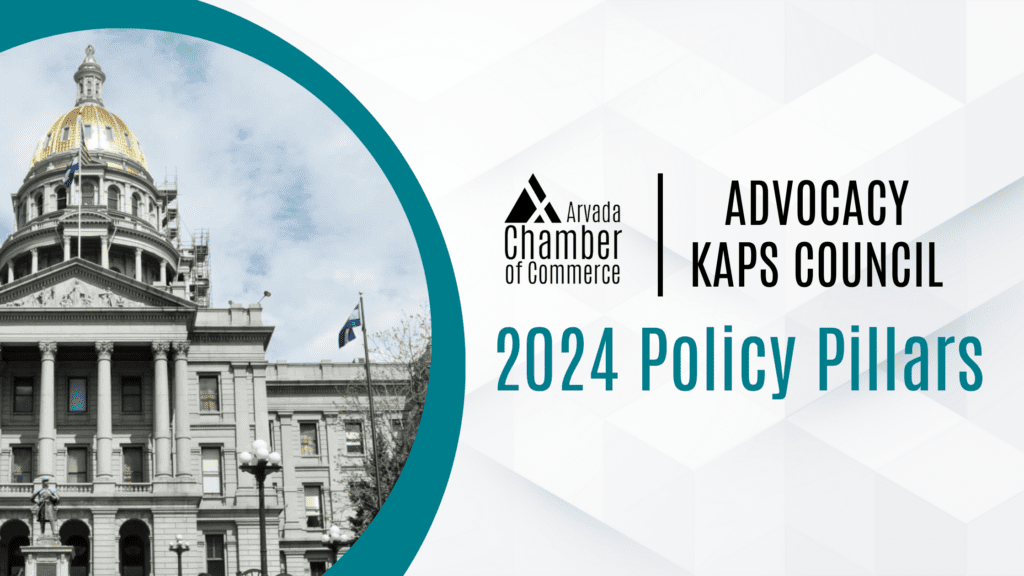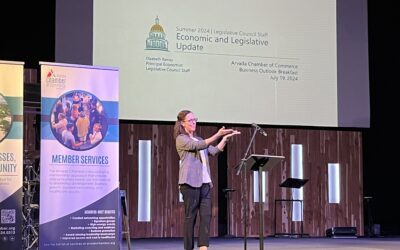Purpose of Pillars
The pillars of the Arvada Chamber of Commerce Advocacy KAPS Council are designed to set general tone and clarity for legislative and policy discussions that impact businesses located within the City of Arvada in both Jefferson and Adams counties. The guidelines listed below are principles that are intended to support a non-partisan pro-business approach to advocacy and lead to focused and robust conversation.
General Policy Approach
The Arvada Chamber of Commerce supports a proactive policy approach that protects the interests of businesses located within the City of Arvada in both Jefferson and Adams counties..
- A regulatory climate that is balanced, consistent, and predictable, thus creating an environment that encourages business growth and stability.
Meaningful initiatives and legislation that minimizes fiscal impact and resource drain on employers, but addresses identified community needs. - Legislation that considers the longevity of funding resources to ensure sustainability.
- Utilize sunset language to ensure legislation has a specific time frame to be evaluated for continuation, revision, or termination.
- A tax structure that does not disproportionately impact businesses.
- A focus on fixing the fundamental problem not temporary or hyper-localized solutions.
Business Regulation
- Support legislation that seeks to identify and eliminate redundancy, inefficiency and contradiction.
- Support an environment that focuses on outreach and education in lieu of penalties for first time or minor issues of non-compliance.
- Support elimination of “red tape” at all levels of government that creates barriers and costs businesses money and resources.
- Oppose legislation that creates new regulation and liability without an appropriate assessment of need and cost, including the cost for businesses to comply with or enforce the legislation.
Workforce and Education
- Support legislation and programs that will continue to provide and expand career and technical education for all K-12 students.
- Support work-based learning opportunities and greater emphasis on career exploration at all levels.
- Support measures that ensure that higher education is affordable and accessible.
- Support employer incentives that promote increased participation from businesses across the Front Range in talent development and work-based learning.
- Support legislation that will provide sustainable funding solutions that are easy to access and do not drain resources from other critical infrastructure.
- Improve Colorado’s longitudinal data on education and workforce training, make it accessible and transparent, and use data to inform investments in workforce programs.
- Create regional talent-development goals and action plans aligned with economic development needs, and then monitor and track progress
Housing
- Advocate for state-level legislation that supports increased production and preservation of affordable and attainable housing units for the workforce.
- Safeguard and enhance existing funding mechanisms for workforce housing.
- Advocate for policies that support state-wide evaluation and enhancement of down payment and assistance programs for a diverse range of income levels.
- Support legislation that expands first-time homebuyer incentives, catering to all income levels, especially those in the 60-120% AMI.
- Support legislation that incentivizes the development or ADU (Accessory Dwelling Units) for primary residences, including incentivizing development and financing costs
- Support legislation that streamlines processes and reduces costs for permitting and local approvals, particularly for affordable/workforce housing.
- Support processes to ensure proposed construction defects legislation recognizes and avoids contradictory policies that may negatively impact development.
- Support comprehensive policies that support state-level zoning, building codes, and engineering design standards to strategically reduce development costs, promoting a business-friendly climate.
- Advocate for measures that provide adequate notice on impact fee proposals and updates.
- Advocate for state-level policies that encourage long-range planning and investment in infrastructure, fostering a conducive environment for business growth.
Child Care
- Advocate for legislative measures that enhance the coherence of childcare regulations. This includes a comprehensive review of existing regulations to eliminate redundancy, resolve contradictions, and provide a clear and concise framework for childcare providers.
- Support legislation and initiatives aimed at streamlining regulatory processes to improve accessibility and affordability for childcare providers. This includes measures to simplify licensing procedures and reduce bureaucratic hurdles.
- Champion legislation that removes zoning barriers for childcare facilities, ensuring that such facilities are recognized as a permissible use in a broad range of zone districts. This effort aims to maximize the availability of childcare services across diverse communities.
- Advocate for initiatives facilitating the co-location of childcare and early childhood education facilities with affordable housing developments. This approach seeks to enhance accessibility and reduce transportation barriers for families, fostering a more inclusive environment.
- Support legislative measures that allocate funds to expand childcare options, encompassing early childhood education, childcare centers, and before-and-after school care. This financial support aims to bolster the overall capacity of childcare services.
- Advocate for legislation incentivizing the growth of childcare capacity through workforce and talent pipeline development. This includes initiatives that promote the recruitment, training, and retention of skilled childcare providers.
- Support legislation and initiatives incentivizing the increase in the number of childcare providers, including licenses and Family-Friend-Neighbor (FFN) care. These efforts contribute to a more robust and diverse childcare provider landscape.
- Support and promote legislative measures encouraging employers to subsidize or incentivize childcare service options for employees. This includes advocating for tax incentives and other benefits to foster employer engagement in childcare support.
The Arvada Chamber Advocacy KAPS Council
Vision: Arvada businesses are the voice that influences pro-industry regulation and opportunity in Arvada, Jefferson County, Adams County and Colorado.



0 Comments